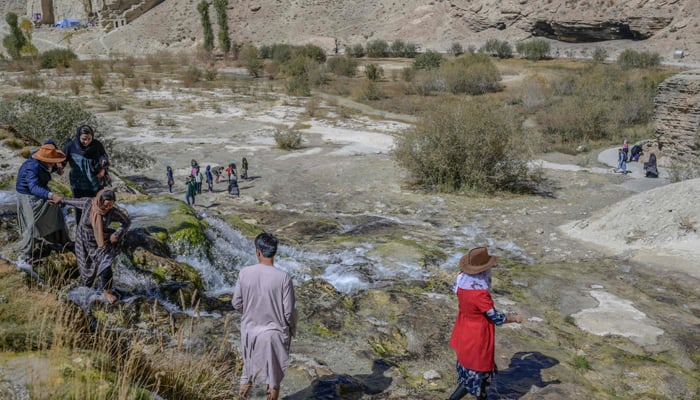Women barred from entering Band-e-Amir National Park in Afghanistan
Band-e-Amir is the first national park of Afghanistan designated in 2009 and has been a tourist destination
The government of the Taliban has barred women from entering Band-e-Amir National Park in Bamiyan province as the official in Afghanistan said that "the ban is based on claims that women have not been adhering to the hijab [veil] requirement within the premises", sparking criticism globally.
The country’s acting minister of virtue and vice Mohammad Khaled Hanafi urged religious clerics and security agencies to stop women from entering the park until a solution is reached.
Band-e-Amir is the first national park of Afghanistan designated in 2009 and has been a tourist destination.
The ban on women's entry impacts families and tourists who seek to enjoy the park's natural beauty and unique geological formations.
The park comprises a collection of naturally created lakes, as per Unesco's description.
According to the Taliban official, visiting the park for sightseeing is not obligatory, implying that the ban should be viewed in this light.
Religious clerics, however, maintained that the women who did not follow hijab regulations were likely non-local visitors.
The ban has attracted criticism from both local and global audiences as the former Afghan MP Mariam Solaimankhil expressed using a poem, vowing a return to the park despite the ban.
Fereshta Abbasi of Human Rights Watch criticised the timing of the ban, highlighting its imposition on Women's Equality Day, labelling it a "total disrespect to the women of Afghanistan."
Richard Bennett, the UN Special Rapporteur on human rights in Afghanistan, questioned the necessity of preventing women from visiting Band-e-Amir to comply with Sharia law and Afghan culture.
The ban on park visits adds to the growing list of restrictions women have faced since the Taliban took control of Kabul in August 2021.
This includes the closure of hair and beauty salons and the prohibition of women from sitting national university entrance exams in mid-July.
Such actions align with the Taliban's historical pattern of temporarily banning women from various activities, raising concerns about gender equality and human rights in the region.
-
Savannah Guthrie speculations 'sadly' coming true about mother Nancy
-
Trump administration warns of slow payouts for tariff refunds amid intensifying trade disputes
-
‘I saw nothing’: Bill Clinton denies knowledge of Epstein’s crimes in House testimony
-
Israel launches attack on Iran's capital and declares state of emergency
-
At least 15 dead after military plane carrying new banknotes plunges out of control in Bolivia
-
Daniel Serafini gets life without parole in in-laws murder and attempted murder case
-
Nakiska Ski Area avalanche leaves youth unresponsive, second skier escapes unhurt
-
Igor Komarov missing in Bali: Seven foreign suspects arrested in kidnapping probe












